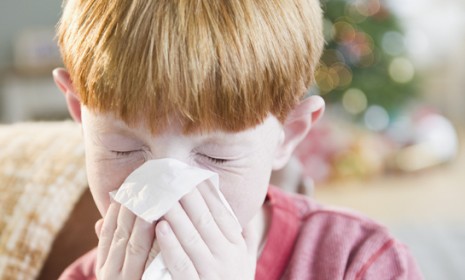'Christmas tree syndrome': An instant guide
Researchers warn that your festive Christmas tree might be making you sick — and offer a few pointers to help you stay healthy through the holidays

A free daily email with the biggest news stories of the day – and the best features from TheWeek.com
You are now subscribed
Your newsletter sign-up was successful
We've all heard of the "war on Christmas." But is Christmas declaring war on us, too? A new study from State University of New York's Upstate Medical University suggests that our beautiful, festive Christmas trees are actually making a lot of unsuspecting Christmas revelers ill, sometimes with dangerous, long-term health problems. What exactly is this "Christmas tree syndrome," and what can you do to prevent it from Grinching up Christmas? Here's what you should know:
What is Christmas tree syndrome?
It's "not as pleasant as it sounds," says Sora Song at TIME. Dr. Lawrence Kurlandsky and his team discovered that the evergreen conifers we bring into our homes carry lots of mold spores that cause a whole range of respiratory and other health problems, from sneezing and watery eyes to insomnia and lethargy. Sometimes our trees cause even more serious health problems, like bronchitis and pneumonia.
The Week
Escape your echo chamber. Get the facts behind the news, plus analysis from multiple perspectives.

Sign up for The Week's Free Newsletters
From our morning news briefing to a weekly Good News Newsletter, get the best of The Week delivered directly to your inbox.
From our morning news briefing to a weekly Good News Newsletter, get the best of The Week delivered directly to your inbox.
Where does the mold come from?
Molds grow on the trees naturally. Your warm living room then acts as an incubator. Once the tree comes inside, the mold spores go nuts. Kurlandsky's study cites separate research that found mold levels exploding after just two weeks of indoor tree display, from 800 spores per 35 cubic feet to 5,000 spores. And the spores aren't benign. The SUNY team examined needles and bark from 28 Christmas trees of varying species and found 53 instances of mold, 70 percent of which can make you sick.
Is everyone susceptible?
No. "If you and your children don't have any obvious allergies, then it is probably not going to bother you," says Kurlandsky. But this syndrome is more common than people think. The reason the SUNY looked into Christmas trees in the first place is because they noticed a spike in respiratory infections in the two weeks surrounding Christmas.
A free daily email with the biggest news stories of the day – and the best features from TheWeek.com
What's a Christmas tree lover to do?
The obvious solution is to buy an artificial tree, says Cassie Murdoch at Jezebel. And if you must go natural, Kurlandsky suggests hosing down your tree outside, then letting it dry before bringing it inside. Some tree lots have tree-washing services. You can also pair your tree with an air purifier to help keep the spore count down. But whatever you do, get that tree to the curb as soon as reasonable after the presents are unwrapped.
-
 5 blacked out cartoons about the Epstein file redactions
5 blacked out cartoons about the Epstein file redactionsCartoons Artists take on hidden identities, a censored presidential seal, and more
-
 How Democrats are turning DOJ lemons into partisan lemonade
How Democrats are turning DOJ lemons into partisan lemonadeTODAY’S BIG QUESTION As the Trump administration continues to try — and fail — at indicting its political enemies, Democratic lawmakers have begun seizing the moment for themselves
-
 ICE’s new targets post-Minnesota retreat
ICE’s new targets post-Minnesota retreatIn the Spotlight Several cities are reportedly on ICE’s list for immigration crackdowns